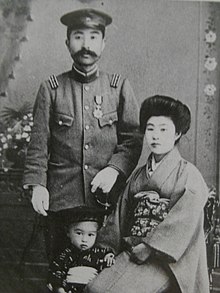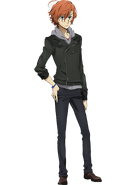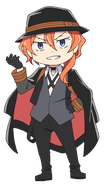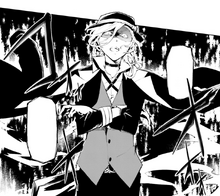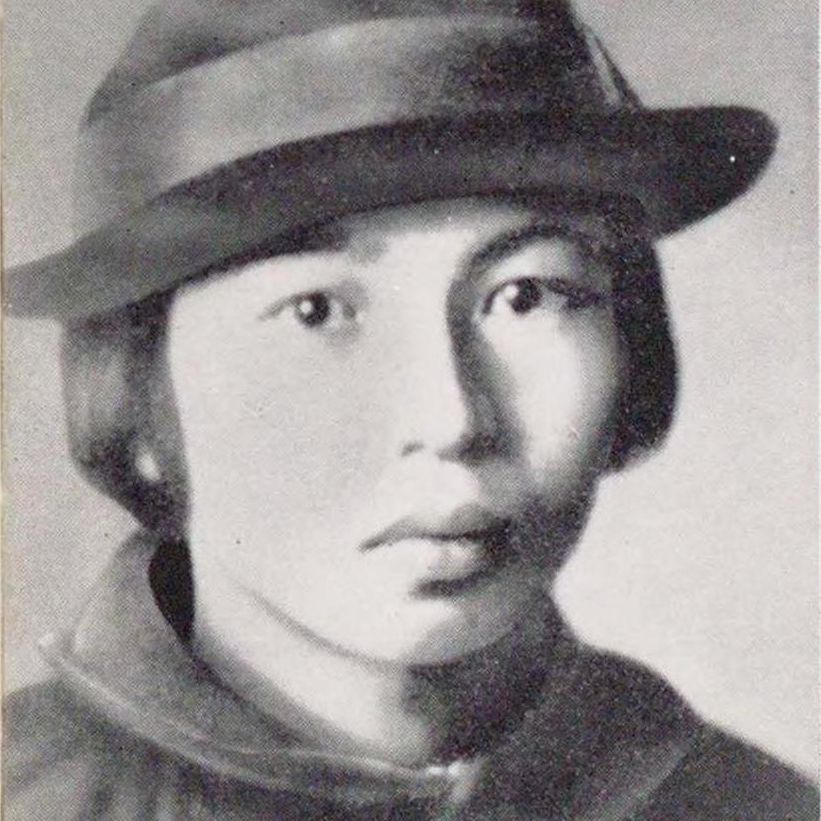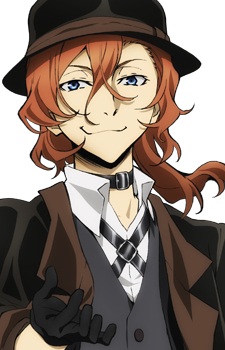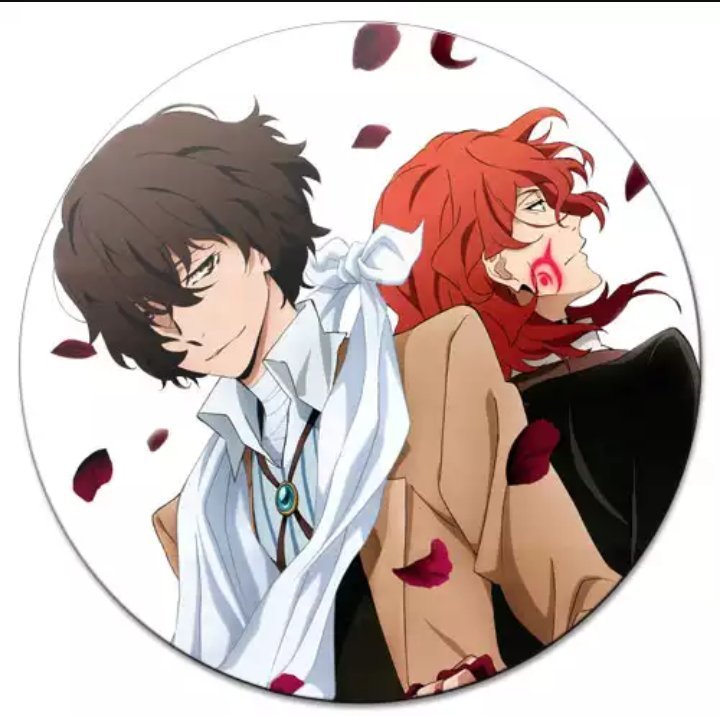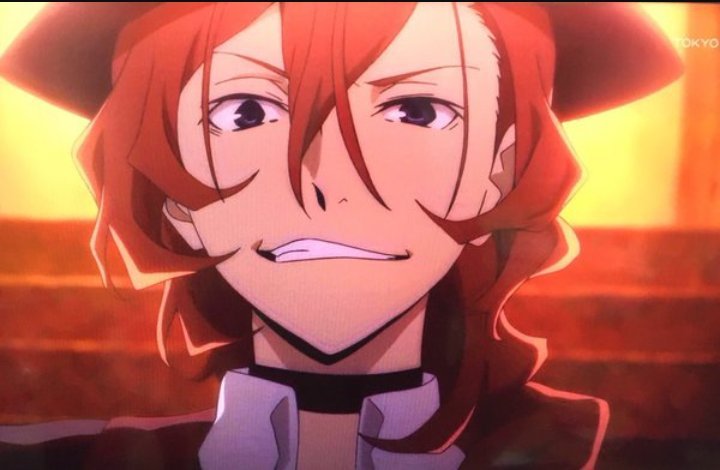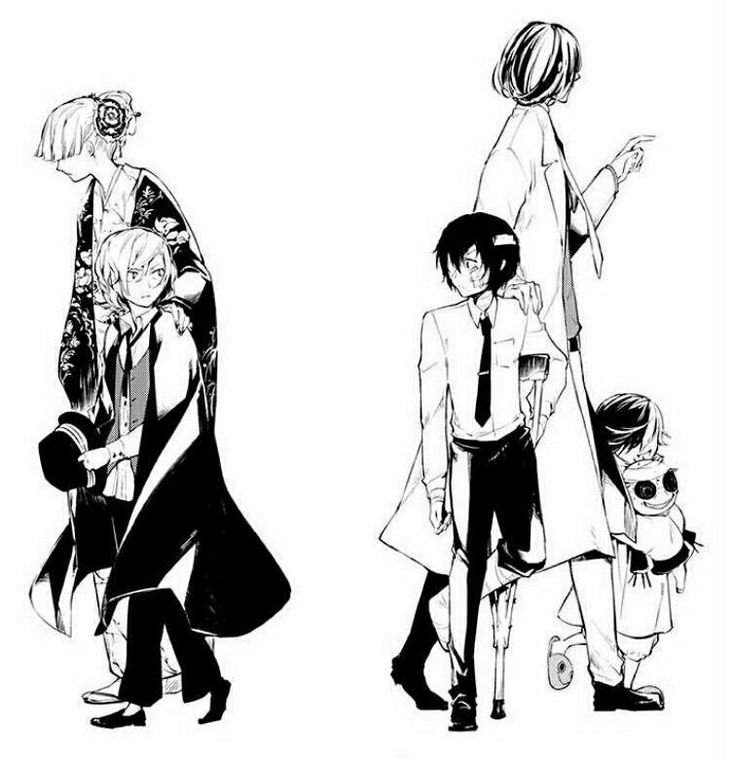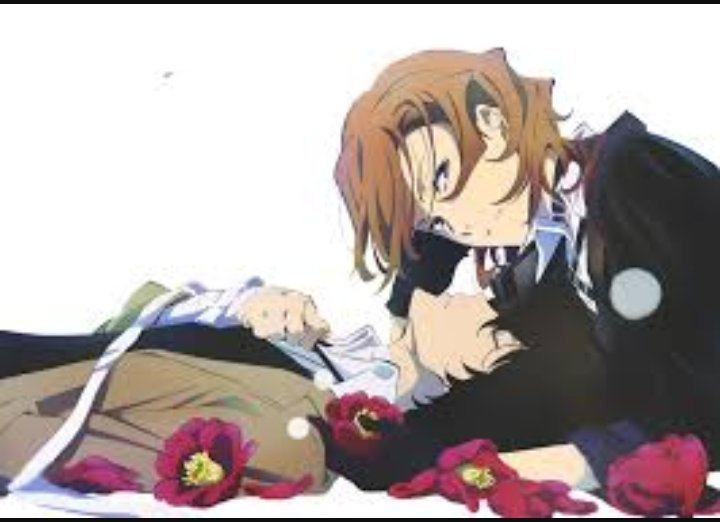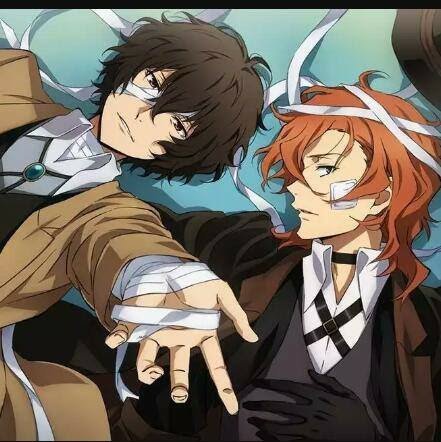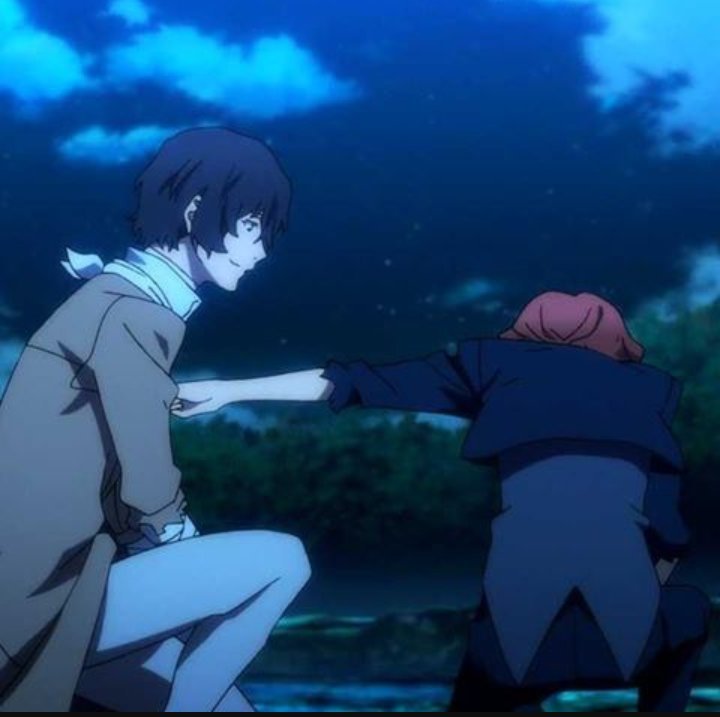From Wikipedia, the free encyclopedia
|
Chūya Nakahara |
|||
|---|---|---|---|

Chūya Nakahara at age 18, circa 1925. |
|||
| Born | Chūya Kashimura 29 April 1907 Yamaguchi, Japan |
||
| Died | 22 October 1937 (aged 30) Kanagawa, Japan |
||
| Occupation | Writer | ||
| Nationality | |||
| Genre | Poetry | ||
| Literary movement | Symbolism, Dadaism | ||
| Notable works |
|
||
| Spouse |
|
||
| Children | 2 | ||
| Japanese name | |||
| Kanji | 中原 中也 | ||
| Hiragana | なかはらちゅうや | ||
|
Chūya Nakahara (中原 中也, Nakahara Chūya, 29 April 1907 – 22 October 1937), born Chūya Kashimura (柏村 中也, Kashimura Chūya), was a Japanese poet active during the early Shōwa period. Originally shaped by Dada and other forms of European (mainly French) experimental poetry, he was one of the leading renovators of Japanese poetry. Although he died at the young age of 30, he wrote more than 350 poems throughout his life. Many called him the «Japanese Rimbaud» for his affinities with the French poet whose poems he translated in 1934.
Early life[edit]
Nakahara Chūya Memorial Hall. © 2006 Oilstreet
Chūya Nakahara was born in Yamaguchi, where his father, Kensuke Kashimura, was a highly decorated army doctor. Kensuke married Fuku Nakahara and was adopted by the Nakahara family shortly after the birth of their son, officially changing their last name to Nakahara. In Nakahara’s earliest years, his father was sent to Hiroshima and Kanazawa where the family followed, only returning to Yamaguchi in 1914. In 1917, Kensuke established his own clinic in the location where nowadays stands the Nakahara Chūya Memorial Hall.
Since his parents had not been blessed with children for six years after their marriage, and because they had no children in the Nakahara family’s hometown, they were delighted with the birth of their first son and celebrated it for three days.[1]
ufo
Education and literary beginnings[edit]
As the eldest son of a prominent doctor, Nakahara was expected to become one himself. Due to the high expectations of his father, Nakahara was given a very strict education, which also prevented him from enjoying an ordinary childhood. Worried about the public morals of the town, Kensuke forbid his son from playing outside with children from a different class to their own. Another example of these restrictions is that, unlike his younger brothers, he was not allowed to bathe in the river for fear that he would drown.[2] As he grew up, severe punishments were inflicted upon him; a common one was being made to stand upright facing the wall. Any sudden move would cause to receive a burn on the heel with a cigarette ember. However, the biggest punishment was being confined to sleep in the barn, which Chūya received dozens of times compared to his brothers.[3] This was intended to prepare him to follow Kensuke’s footsteps and to become the head of the family.
As a middle schooler, Nakahara had excellent grades and was called a prodigy child. It was the death of his younger brother Tsugurō in 1915, when he was 8 years old, which awakened him to literature. Grief-driven, he turned to compose poetry. He submitted his first three verses to a women’s magazine and local newspaper in 1920 when he was still in elementary school. In the same year, he passed the entrance examination to Yamaguchi Junior High School with brilliant results. It was from this point onwards that he started to rebel against his father’s strictness. He no longer studied and his grades began to drop as he became increasingly absorbed by literature. Kensuke was extremely afraid of the influence of literature on his son. Once, having found a work of fiction Nakahara had hidden, he severely scolded him and, once again, confined him in the barn. It was around this time when Nakahara also began to drink and smoke, making his grades go even lower.[citation needed]
In 1923, he failed his third-year examination. It is said that Nakahara invited a friend to his study room, broke the answer sheet and chanted «hurrah».[citation needed] The failure seems to have been deliberate. For as long as he did not fail, he was bound to remain under his strict parents’ surveillance. On the other hand, Kensuke received the news with utter shock at what meant to him a deep humiliation. He resorted once more to striking his son and keeping him in the barn on the cold night of March. Regardless of this, Nakahara insisted on not going back to this school. This culminated in his father’s defeat, ultimately leading to an apology for his “educational policy”. In light of these events, he was transferred to the Ritsumeikan Middle School in Kyoto, where Nakahara begin to live alone but still, and until the end of his days, at the expense of his family.
In Kyoto he found many of the influences that would ultimately shape him as a poet. He read Shinkichi Takahashi’s Dadaist poetry, which shocked him into starting to write again. This artistic movement became a part of his poetic lifestyle and later earned him the nickname “Dada-san”. In winter he met the actress Yasuko Hasegawa, three years his senior, and in April 1924 they began living together. It is also in this very year that Chūya became friends with fellow poet Tominaga Tarō. After completing Junior High School, Chūya and Yasuko decided to follow Tominaga to Tokyo, on the basis of attending university there. As he was unable to take the exam due to a lack of documents or being late, he was sent out by his family on the condition that he would go to a preparatory school instead.
After dropping the preparatory course in 1926, of which his parents were not informed, he started studying French at the Athénée Français.
Literary career[edit]
Nakahara Chūya and Takako Ueno married in 1933
His verse has been considered somewhat obscure, and confessional and gives a general impression of pain and melancholy, emotions which were a constant throughout the poet’s life.
Initially, Nakahara favoured poetry in the Japanese traditional tanka format, but he was later (in his teens) attracted to the modern free verse styles advocated by the Dadaist poet Takahashi Shinkichi and by Tominaga Tarō. After he moved to Tokyo, he met Kawakami Tetsutaro and Shōhei Ōoka, with whom he began publishing a poetry journal, Hakuchigun (Group of Idiots). He was befriended by the influential literary critic Kobayashi Hideo, who introduced him to the French symbolist poets Arthur Rimbaud and Paul Verlaine, whose poems he translated into Japanese. The influence of Rimbaud went beyond just his poetry, and Nakahara came to be known for his «bohemian» lifestyle.
Nakahara adapted the traditional counts of five and seven used in Japanese haiku and tanka, but frequently tripped these counts with variations, in order to obtain a rhythmical, musical effect. Several of his poems were used as lyrics in songs, so this musical effect may have been carefully calculated from the start. Chūya’s works were rejected by many publishers, and he found acceptance primarily with the smaller literary magazines, including Yamamayu, which he launched together with Hideo Kobayashi, (although on occasion Shiki and Bungakukai would condescend to publish one of his works). He remained close friends with Kobayashi all of his life, despite the fact that in November 1925 Yasuko Hasegawa left Nakahara and began living with Kobayashi Hideo instead. This event took place right after the loss of his friend Tominaga. In December 1927, he met composer Saburō Moroi, who later adapted a number of his verses to music, such as Asa no Uta (朝の歌, «Morning Song») and Rinjū (臨終, «Deathbed»). In April 1931, Chūya was admitted to the Tokyo Foreign Language College in Kanda to study the French language, where he remained until March 1933.
Nakahara married Takako Ueno (a distant relative) in December 1933, and his first son, Fumiya, was born in October 1934. However, the death of his son in November 1936, due to tuberculosis, sent him into a nervous breakdown. Nakahara never fully recovered from this, despite the birth of his second son in December. Many of his later poems seem like remembrances and attempts to mitigate this enormous pain.
Nakahara was hospitalized in Chiba sanatorium in January 1937. In February, he was released and moved back to Kamakura, as he could not stand to continue living in the house which contained the memories of Fumiya. He left a number of his works with Kobayashi and was making plans to return to his hometown of Yamaguchi when he died in October 1937, at the age of 30, of tubercular meningitis.[4] Shortly after, his second son died of the same illness.
His grave is at his hometown of Yamaguchi. This is the very family grave which appears in his uncollected poem «Cicadas» (蟬, Semi).
Legacy[edit]
Only one of his poetry anthologies, Yagi no Uta (山羊の歌, «Goat Songs», 1934) was published while he was alive (in a self-financed edition of two hundred copies). He edited a second collection, Arishi Hi no Uta (在りし日の歌, «Songs of Bygone Days», 1938) just before his death. During his lifetime, Nakahara was not counted among the mainstream poets. However, the emotional and lyrical nature of his verses has a wide and increasing following even to this day, especially among young people. Nakahara is now a subject of classroom study in Japanese schools, and his portrait in a hat with a vacant stare is well known. Kobayashi Hideo, to whom Nakahara entrusted the manuscript for Arishi Hi no Uta on his deathbed, was responsible for the posthumous promotion of his works. So was Ooka Shohei for collecting and editing The Complete Works of Nakahara Chūya, a collection containing the poet’s uncollected poems, his journals, and many letters.
- A literary award, the Nakahara Chūya Prize, was established in 1996 by Yamaguchi city (with the support of publishers Seidosha and Kadokawa Shoten) in Chūya’s memory. The award is presented annually to an outstanding collection of contemporary poetry characterized by a «fresh sensibility» (shinsen na kankaku). The winner receives a cash award of 1 million yen, and for several years, the winning collection was also published in an English language translation, but in recent years, the administrations of the award have stopped translating the winner.
- The acid-folk singer Kazuki Tomokawa recorded two albums entitled Ore no Uchide Nariymanai Uta and Nakahara Chuya Sakuhinnshu, using Nakahara’s poems as lyrics.
See also[edit]
- Japanese literature
- List of Japanese authors
References[edit]
- ^ Nakahara, Kurō (1976). Sea Journey (1976 ed.). Tokyo: Showa Shuppan.
- ^ Thunman, Noriko (1983). Nakahara Chūya and French Symbolism (1983 ed.). Stockholm: University of Stockholm. p. 5. ISBN 91-7146-314-3.
- ^ Nakahara, Kurō (1976). Sea Journey (1976 ed.). Tokyo: Shōwa Shuppan.
- ^ Ken, Aoki (2004). Nakahara Chuya — Eternal Autumn (2004 ed.). Kawade Shobo Shinsa. p. 364. ISBN 4-309-01611-1.
- Nakahara, Chuya. (Beville, Ry. Trans.), Poems of Days Past (Arishi hi no uta). American Book Company (2005). ISBN 1-928948-08-1
- Nakahara, Chuya. (Beville, Ry. Trans.), Poems of the Goat. American Book Company (2002). ISBN 1-928948-08-1
ISBN 1-928948-04-9
- Nakahara, Chuya, (Paul Mackintosh, Maki Sugiyama.Trans)The poems of Nakahara Chūya(1993).ISBN 978-0852442555
- Kurahashi, Ken’ichi. Shinso no jojo: Miyazawa Kenji to Nakahara Chuya (Miyazawa Kenji ron sosho). Yadate Shuppan; (1992). ISBN 4-946350-02-0 (Japanese)
- Thunman, Noriko. Nakahara Chuya and French symbolism. University of Stockholm (1983). ISBN 91-7146-314-3
- Shohei, Ooka. Nakahara Chuya. Kodansha (1989). ISBN 4061960377 (Japanese)
- Ken, Aoki. Nakahara Chuya — Eternal Autumn. Kawade Shobo Shinsha (2004). ISBN 4-309-01611-1 (Japanese)
- Nakahara, Kurō. Sea Journey. Shōwa Shuppan (1976) (Japanese)
External links[edit]
- Nakahara Chūya Memorial Museum in Yamaguchi (Japanese site)
- e-texts of Chūya’s works at Aozora bunko (Japanese site)
- Nakahara Chuya
- Works by or about Chūya Nakahara at Internet Archive
- Works by Chūya Nakahara at LibriVox (public domain audiobooks)
- This article is about the implied original. For the clone of the same name, see Chūya Nakahara (Clone).
Chūya Nakahara (
Appearance
Chūya is quite short with a petite, yet muscular build. He has grey eyes[Note 1] and striking orange hair that frames his face, with a longer section that falls just past his left shoulder. He wears a black hat with a red hatband and a thin silver chain that hangs over the brim.
His outfit consists of a white button-up shirt under a dark red vest, a black choker, a black ribbon bolo tie held together with a small silver buckle, an open black cropped jacket with the sleeves rolled up at the elbows, black slacks, a black belt hanging off his right hip and black low-arch shoes. He is almost always seen wearing black gloves. Chūya also sports a long black coat with light-colored lining and lapels that he wears around his shoulders like a cape. The undercoat is a light shade of red.
In the past, he wears a short black pea coat over his hoodie. He also wears black pants and brown shoes. A bracelet can also be seen on his right wrist.
After being bitten by an unknown aggressor, Chūya takes on a vampiric appearance.[3]
Chūya (15 years old)
Chūya’s vampiric appearance
Others
Wan! appearance
Personality
Chūya showing his temperament on seeing Dazai.
On the surface, Chūya is a temperamental and rather arrogant, blunt man. He revels in fighting, happy to show off his combative ability, and taking great pride in his reputation as the mafia’s strongest martial artist. Taunting remarks pair with his pride, as he isn’t above ridiculing his opponents in the middle of a fight. Befitting of an Executive, he has no qualms eliminating the Port Mafia’s enemies by any means necessary, including murder, however, isn’t nearly as homicidal in his tactics as members such as Ryunosuke Akutagawa and the members of Black Lizard tend to be.[4]
For as hot-headed as he may seem, Chūya isn’t impossible to reason with. In fact, he’s rather reasonable when no one is pushing his buttons. While his skills and presence signal an inherent threat, he’s reliable enough for Mori to assign him the task of confronting the Armed Detective Agency during the three-way conflict involving the Guild.[5] It’s true he didn’t hesitate to retaliate and fight back against Akiko Yosano and Kenji Miyazawa (in fact, he takes great pleasure fighting against people that put up a good fight), but as soon as Yukichi Fukuzawa addresses him for more information, Chūya disengages from the battle. Here as well, his nature as a mafioso shines through, expressing no remorse for the danger the mafia intentionally put Naomi Tanizaki and Hirako in, using them as bait. In fact, he’s rather smug about it, knowing it angers the Agency immensely.[6]
Ruthless as he is, Chūya seldom takes people’s lives for granted and knows the importance of compromise and rationality. He refrains from unnecessarily brutal methods when need-be, and has enough sense to know when enough’s enough. Notable instances include his conflict with Arthur Rimbaud, the man responsible for attempting to kill him long before he joined the Port Mafia at age fifteen. Chūya fully intended to kill him, but heard Rimbaud’s last words without malice nor mockery. In fact, Rimbaud’s final words for him had a deep effect on Chūya’s own outlook on life and himself. He receives Rimbaud’s hat as an entry gift to the Port Mafia and takes good care of the hat as a result.[1]
After Osamu Dazai «mercy killed» an enemy, only to repeatedly shoot and laugh at the corpse, Chūya demanded he stops, seeing no sense in Dazai’s actions. Chūya’s grudge against Ango Sakaguchi does not stop him from acknowledging the fact he owes the man a favor, and as such refrains from antagonizing Ango (and, by extension, his subordinate Mizuki Tsujimura) until he can repay his debt.[7]
Just as Chūya took his responsibility defending Sheep’s well-being from their enemies, this holds true for his loyalty and devotion to Port Mafia after joining. So as reasonable as he may be, his top priority is Port Mafia’s prosperity and well-being, thus nothing will stop him from fulfilling his responsibilities as an Executive even at the cost of other’s lives. Fierce in his loyalties, Chūya finds betrayal intolerable and treats his subordinates quite well.[1]
In the past, Chūya struggled greatly with his identity and place in humanity. His connection to Arahabaki ended in him questioning how human he truly was, worsened by not knowing the truth behind why he was freed from the government’s possession in the first place. While his strength lies in his ability, the awareness of a god’s effects on him left him feeling as though he wouldn’t feel worried nor fear in a fight, knowing he’d most likely win without a scratch. He attributed this to being — in his mind — inhuman, and thus unable to understand the depth of such emotions.
In order to give himself a sense of restraint, he preferred kicking largely over throwing fists, never even removing his gloves. He figured if he came to a fight where he had to remove his gloves, it was because he could no longer enjoy the rush of a battle, and genuinely needed to defend himself — in other words feeling an attachment to the life he lived, even if he felt like a foreign soul in a shell, rather than a human being. This holds true to the present, as Chūya’s only seen removing his gloves when using Corruption in dire moments.
After Rimbaud elaborated his own beliefs on humanity, Chūya had a bit of a change of heart, taking his own life a bit more seriously. The Sheep’s betrayal affected him greatly, alongside Port Mafia’s direct involvement in uncovering the truth of his origins, but ultimately led to his loyalty in them. The drive for learning more about himself contributed largely to his rise in rank, much faster than anticipated.
Chūya’s ultimate downfall is his intense disdain and hatred for Dazai. The two never got along, with Chūya instantly hating Dazai’s underhanded, warped strategic personality. Dazai has always gone out of his way to dehumanize and ridicule Chūya, constantly attacking his pride and even driving Sheep to abandon and betray him in the past. Even now, the slightest insult from Dazai will set Chūya off on a tangent, taking full advantage of his quick temper and pride. This makes it easy to distract Chūya from tasks at hand. Nonetheless, as part of Twin Dark’s nature, Chūya acknowledges Dazai’s role as the tactician, extending minimal trust in at least knowing that Dazai knows how to effectively overcome a situation.
Ability
- Main article: Upon the Tainted Sorrow
His ability, Upon the Tainted Sorrow (
| Upon the Tainted Sorrow ( |
||

|
Manga Debut: | Chapter 22 |
|---|---|---|
| Anime Debut: | Episode 18 | |
| Ability: | Gravity Manipulation |
Battles
- Main article: List of Battles
Fifteen Arc
Port Mafia Arc
The Guild Arc
Cannibalism Arc
Hunting Dogs Arc
DEAD APPLE
Appearances
Manga Appearances
Chapters in order of appearance
Anime Appearances
Episodes in order of appearance
Quotes
- (To Mizuki Tsujimura) «Do you know when it’s alright to chicken out and go home? There is no such time.«[7]
Etymology
- The name Chūya means «inside» (中) (chu/naka) and «to be» (也) (ya).
- The name Nakahara means «inside» (中) (chu/naka) and «plains» (原) (hara).
Namesake
- Main article: Real-life References#Chūya Nakahara
- Famous for the lyrical qualities of his poems, Nakahara played with the rhythms of classic Japanese forms of poetry, such as waka, haiku, and tanka, while also taking influence from French styles. His poem «Upon the Tainted Sorrow» emphasizes hoplessness and the fleeting nature of life. [8]
Trivia
- The real life Chūya Nakahara‘s birthname is Chūya Kashimura (柏村 中也).
- In BONES’ anime adaptation, his hat chain and the belt at his side are omitted, and his vest is depicted as grey. He also has blue eyes.
- The chanting required in order to activate Corruption originates from a stanza in «Sheep Song»,[9] a poem from Chūya Nakahara to Yoshihiro Yasuhara. «Sheep Song» later becomes the origin of his former group, the Sheep.
- He taunts Dazai as an «enemy of women». This might be due to Dazai’s womanizing habits.[10]
- His Japanese voice actor, Kishō Taniyama, is the singer of GRANRODEO who sung the OP theme of Bungo Stray Dogs season 1 — TRASH CANDY. GRANRODEO later sang again for DEAD APPLE’s OP theme, Deadly Drive, and season 3’s OP theme, Setsuna no Ai.
- Despite liking alcohol, he tends to get drunk pretty easily.[11]
- He smokes on rare occasions. Mostly when stressed and irritated.[11]
- Arahabaki is an ancient Japanese god shrouded in mystery, its origins and historical relevance drenched with unreliable, scattered accounts. One theory considered it a sort of «guest god», on or lower a level of power of the main of a shrine it manifests in.[12]
Notes
- ↑ Studio BONES changes them to blue in the anime adaptation.
References
- ↑ 1.0 1.1 1.2
Bungo Stray Dogs: DEAD APPLE (Light Novel). - ↑ 2.0 2.1 2.2 2.3 2.4 2.5 2.6
Bungo Stray Dogs Manga: Volume 6. - ↑ 3.0 3.1
Bungo Stray Dogs Manga: Chapter 98. - ↑
Bungo Stray Dogs Manga: Chapter 10. - ↑
Bungo Stray Dogs Manga: Chapter 21. - ↑
Bungo Stray Dogs Manga: Chapter 22. - ↑ 7.0 7.1
Bungo Stray Dogs: DEAD APPLE (Film). - ↑
Bungo Stray Dogs Manga: Volume 3,
Author Guide.
- ↑ The Moon, and: Sheep Song. Project MUSE.
- ↑
Bungo Stray Dogs Manga: Chapter 31. - ↑ 11.0 11.1
Bungo Stray Dogs Manga: Volume 4,
Omake.
- ↑ 謎の神 アラハバキ § 民俗学からみたアラハバキ. Act9 — Katsuhiko Takahashi official site (in Japanese).
Site Navigation
| Ability Users | ||
|---|---|---|
| Main | ||
| Armed Detective Agency | Members | Akiko Yosano · Atsushi Nakajima · Doppo Kunikida · Jun’ichirō Tanizaki · Kenji Miyazawa · Kyōka Izumi · Osamu Dazai · Yukichi Fukuzawa |
| Former | Katai Tayama | |
| Port Mafia | Members | Ace† · Chūya Nakahara┬ · Colonel† · Kōyō Ozaki · Kyūsaku Yumeno · Lippmann† · Michizō Tachihara · Motojirō Kajii · Ōgai Mori · Paul Verlaine · Randō† · Ryūnosuke Akutagawa┬ · Ryūrō Hirotsu · Osamu Dazai |
| Former | Ango Sakaguchi · Kyōka Izumi · Osamu Dazai | |
| The Guild | Renewed Guild | Francis Scott Key Fitzgerald · Louisa May Alcott |
| Suriving Guild Forces | John Steinbeck | |
| Former Guild | Edgar Allan Poe · Herman Melville · Lucy Maud Montgomery · Margaret Mitchell · Mark Twain · Nathaniel Hawthorne | |
| Rats in the House of the Dead | Alexander Pushkin · Fyodor Dostoevsky · Ivan Goncharov · Mushitarō Oguri · Nathaniel Hawthorne | |
| Decay of the Angel | Bram Stoker┬ · Fyodor Dostoevsky · Kamui · Nikolai Gogol · Sigma | |
| Hunting Dogs | Members | Ōchi Fukuchi · Saigiku Jōno · Teruko Ōkura · Tetchō Suehiro |
| Former | Michizō Tachihara | |
| Order of the Clock Tower | Dame Agatha Christie | |
| Sheep | Chūya Nakahara┬ | |
| Transcendents | Arthur Rimbaud† · Johann Wolfgang von Goethe · Paul Verlaine · William Shakespeare · Victor Hugo | |
| Mimic | André Gide† | |
| The Seven Traitors | Jules Gabriel Verne† | |
| Special Division for Unusual Powers |
Ango Sakaguchi · Mizuki Tsujimura · Santōka Taneda | |
| V | Jun Mitamura† (implied) | |
| Unaffiliated | Herbert George Wells · Nemo · Sōseki Natsume · Tatsuhiko Shibusawa† · Wasp | |
| Unnamed | Blond Guy† · Criminal Ability User† · Kyōka’s Mother† · The Soldier† | |
| Gaiden | ||
| Main | Natsuhiko Kyōgoku · Mizuki Tsujimura · Yukito Ayatsuji | |
| Other | Ango Sakaguchi | |
| BEAST | ||
| Armed Detective Agency | Akiko Yosano · Doppo Kunikida · Jun’ichirō Tanizaki · Kenji Miyazawa · Ryūnosuke Akutagawa · Sakunosuke Oda · Yukichi Fukuzawa | |
| Port Mafia | Atsushi Nakajima · Chūya Nakahara · Kyōka Izumi · Osamu Dazai · Ryūrō Hirotsu |
| Port Mafia | ||
|---|---|---|
| Leader | Ōgai Mori | |
| Executives | Ace† · Colonel† · Chūya Nakahara · Kōyō Ozaki · Paul Verlaine | |
| Sub-Executive | Randō† | |
| Flags | Albatross† · Doc† · Iceman† · Lippmann† · Piano Man† | |
| Command Unit | Ryūnosuke Akutagawa · Ichiyō Higuchi | |
| Black Lizard | Squad Leader | Ryūrō Hirotsu |
| Battalion Leaders | Gin Akutagawa · Michizō Tachihara | |
| Members | Elise · Karma† · Kazuma Utagawa† · Kurehito Umeki† · Kyūsaku Yumeno · Miroku Ishige† · Motojirō Kajii · Sakunosuke Oda† · Shōkichi Saegusa† | |
| Former | Leader | Unnamed Previous Boss† |
| Executive | Osamu Dazai | |
| Members | Ango Sakaguchi · Kyōka Izumi |
| Sheep | |
|---|---|
| Leader | Chūya Nakahara |
| Members | Buichirō Shirase · Yuan |
| Nakahara Chūya | |
|---|---|
 Nakahara Chūya |
|
| Born | 29 April 1907 Yamaguchi Japan |
| Died | 22 October 1937 (aged 30) Kanagawa Japan |
| Occupation | Writer |
| Genres | Poetry |
| Literary movement |
Symbolism Dadaism |
Chūya Nakahara (中原 中也 Nakahara Chūya?) (29 April 1907 — 22 October 1937) was a Japanese poet active during the early Shōwa period of Japan.
Early life
Nakahara Chūya was born in Yamaguchi Yamaguchi Prefecture in 1907, where his father was an army doctor. In his early life, his father was posted to Hiroshima and Kanazawa, returning to Yamaguchi in 1914. In 1915, his younger brother died, and in sorrow he turned to composing poetry. He submitted his first three verses to a local newspaper in 1920, when he was still in elementary school. In 1923, he moved to the Ritsumeikan Middle School in Kyoto. He later graduated from the Foreign Studies Department of Tokyo Imperial University.
Literary career
Initially, Chūya favored poetry in the Japanese traditional tanka format, but he was later (in his teens) attracted to the modern free verse styles advocated by Dadaist poet Takahashi Shinkichi and by Tominaga Tarō.
After he moved to Tokyo, he met Kawakami Tetsutaro and Ooka Shohei, with whom he began publishing a poetry journal, Hakuchigun (Idiots). He was befriended by the influential literary critic Kobayashi Hideo, who introduced him to the French symbolist poets Arthur Rimbaud and Paul Verlaine, whose poems he translated into Japanese. The influence of Rimbaud went beyond just his poetry, and Nakahara came to be known for his «bohemian» lifestyle.
Chūya adapted the traditional counts of five and seven used in Japanese haiku and tanka, but frequently tripped these counts with variations, in order to obtain a rhythmical, musical effect. Several of his poems were used as lyrics in songs, so this musical effect may have been carefully calculated from the start.
Chūya’s works were rejected by many publishers, and he found acceptance primarily with the smaller literary magazines, including Yamamayu, which he launched together with Kobayashi Hideo, (although on occasion Shiki and Bungakukai would condescend to publish one of his works). He remained close friends with Kobayashi all of his life, despite the fact that his girlfriend left him for Kobayashi shortly after their first meeting. He eventually married and had a daughter who died in infancy, which sent him into a nervous breakdown from which he never fully recovered. Many of his later poems seem like remembrances and attempts to mitigate this enormous pain.
Chūya died at the age of 30 of cerebral meningitis. Only one of his poetry anthologies, Yagi no Uta («Goat Songs», 1934) appeared while he was alive (in a self-financed edition of two hundred copies). He had edited a second collection, Arishi Hi no Uta («Songs of Bygone Days») just before his death.
During his lifetime, Chūya was not counted among the mainstream of poets, but his verses have a wide and increasing following even to this day. Chūya is now a subject of classroom study in Japanese schools, and his portrait in a hat with a vacant stare is well known. Kobayashi Hideo, to whom Chūya entrusted the manuscript for Arishi Hi no Uta on his deathbed was responsible for the posthumous promotion of his works, and Ooka Shohei for collecting and editing The Complete Works of Nakahara Chūya, a collection containing the poet’s uncollected poems, his journals, and many letters.
Legacy
- A literary award, the Nakahara Chūya Prize was established in 1996 by Yamaguchi city (with the support of publishers Seidosha and Kadokawa Shoten) in Chūya’s memory. The award is presented annually to an outstanding collection of contemporary poetry characterized by a «fresh sensibility» (shinsen na kankaku). The winner receives a cash award of 1 million yen, and the winning collection is also published in an English language translation.
- The acid-folk singer Kazuki Tomokawa recorded two albums entitled Ore no Uchide Nariymanai Uta and Nakahara Chuya Sakuhinnshu, using Nakahara’s poems as lyrics.
See also
- Japanese literature
- List of Japanese authors
References
- Nakahara, Chuya. (Beville, Ry. Trans.), Poems of Days Past (Arishi hi no uta). American Book Company (2005). ISBN 1928948081
- Nakahara, Chuya. (Beville, Ry. Trans.), Poems of the Goat. American Book Company (2002). ISBN 1928948081
ISBN 1928948049
- Thunman, Noriko. Nakahara Chuya and French symbolism. University of Stockholm (1983). ISBN 9171463143
- Kurahashi, Ken’ichi. Shinso no jojo: Miyazawa Kenji to Nakahara Chuya (Miyazawa Kenji ron sosho). Yadate Shuppan; (1992). ISBN 4946350020 (Japanese)
External links
- Fan page in English and Japanese
- Nakahara Chūya Memorial Museum in Yamaguchi (Japanese site)
- e-texts of Chūya’s works at Aozora bunko (Japanese site)
- Literary figures of Kamakura
|
Animeography
Mangaography
Member Favorites: 8,757 |
>
>
Age: 22 Executive Member of the Port Mafia. (Source: Easy Going Scans) Voice Actors
|
Ничего не найдено.
См. также в других словарях:
-
Nakahara Chuya — Chūya Nakahara Nakahara chuya Chūya Nakahara (中原 中也 en japonais), né le 29 avril 1907 dans la préfecture de Yamaguchi et décédé le 22 octobre 1937 à Tōkyō, était un poète japonais. Beaucoup le qualifient de « Rimbaud japonais » pour ses … Wikipédia en Français
-
Nakahara Chūya — (jap. 中原 中也; * 29. April 1907 in der Präfektur Yamaguchi; † 22. Oktober 1937 in Tokio) war ein japanischer Lyriker. Leben Nakahara verfasste seine ersten Gedichte als Achtjähriger, schickte als Grundschüler … Deutsch Wikipedia
-
NAKAHARA CHUYA — (1907–1937) Nakahara Chuya was a poet from Yamaguchi Prefecture. When Nakahara was just eight years old, his younger brother died and Nakahara sought solace for his mourning in poetry. He originally composed tanka, but in his teens became more … Japanese literature and theater
-
Chūya Nakahara — Nakahara Chūya Nakahara Chūya Born 29 April 1907(1907 04 29) Yamaguchi Japan Died 22 October 1937(1937 10 22) (aged 30) Kanagawa Jap … Wikipedia
-
Chuya Nakahara — Chūya Nakahara Nakahara chuya Chūya Nakahara (中原 中也 en japonais), né le 29 avril 1907 dans la préfecture de Yamaguchi et décédé le 22 octobre 1937 à Tōkyō, était un poète japonais. Beaucoup le qualifient de « Rimbaud japonais » pour ses … Wikipédia en Français
-
Chūya Nakahara — Nakahara chuya Chūya Nakahara (中原 中也 en japonais), né le 29 avril 1907 dans la préfecture de Yamaguchi et décédé le 22 octobre 1937 à Tōkyō, était un poète japonais. Beaucoup le qualifient de « Rimbaud japonais » pour ses affinités avec … Wikipédia en Français
-
Nakahara — bezeichnet: Nakahara ku (Kawasaki), einen Stadtbezirk der japanischen Stadt Kawasaki Nakahara ist der Familienname folgender Personen: Aya Nakahara, japanische Manga Zeichnerin Nakahara Chūya (1907–1937), japanischer Dichter Kellye Nakahara (*… … Deutsch Wikipedia
-
Kazuki Tomokawa — Surnom Kazuki Tomokawa (友川かずき, Tomokawa Kazuki?) Nom Tenji Nozoki ( … Wikipédia en Français
-
Накахара, Тюя — Накахара Тюя Имя при рождении: Накахара Тюя Дата рождения: 29 апреля 1907(1907 04 29) Место рождения: Ямаг … Википедия
-
Kazuki Tomokawa — Infobox Musical artist Name = Kazuki Tomokawa Img capt = Img size = Landscape = Background = solo singer Birth name = Alias = Tenji Nozoki Born = Birth date and age|1950|2|16|mf=y Died = Origin = Japan Instrument = Genre = Occupation = Years… … Wikipedia
-
Shōhei Ōoka — Ōoka Shōhei Born March 6, 1909(1909 03 06) Tokyo, Japan Died December 25, 1988(1988 12 25 … Wikipedia
Член «Портовой мафии» и бывший напарник Осаму Дадзая. Является одним из пяти руководителей «Портовой мафии». Вспыльчив. Отлично анализирует данные во время боя и может быть очень наивным, как это было показано, когда Дадзай поставил его перед дилеммой. Способность — «Смутная печаль», манипулирование гравитационным полем и силой тяжести объектов, находящихся с ним в физическом контакте.
Полное имя Чуя Накахара
Японское написание 中原 中也
Ромадзи Nakahara Chūya
Прозвища Мистер Модная Шляпа
Статус Неизвестно
Возраст 22 года
Пол Мужской
День рождения 29 апреля
Рост 160 см
Вес 60 кг
Группа крови B (III)
Любит Шляпы, сражения, выпивку, музыку
Не любит Дазая Осаму
Профессия Руководитель Мафии
Организация Порт Мафии
Название Способности «Смутная печаль»
●○●○●○●○●○●○●○●○●○●○●○
Чуя Накахара (中原 中也, Nakahara Chūya) — член Портовой мафии и бывший напарник Осаму Дазая. Он является одним из членов Исполнительного комитета Портовой мафии. Обладает способностью «Смутная печаль».
☆ЛИЧНОСТЬ☆
Накахара отлично анализирует данные во время боя, однако он может быть очень наивным.
Также Чуя знаменит тем, что является лучшим бойцом Портовой мафии, обладающим невероятной ловкостью, скоростью и силой.
Ещебыло показано, что Чуя является прекрасным лидером, который дорожит своими подчинёнными и готов сделать всё, чтобы защитить город.
☆ВНЕШНОСТЬ☆
Чуя является обладателем низкого роста, однако, несмотря на худощавое телосложение, он невероятно силён. У него голубые глаза и рыжие волосы, которые обрамляют его лицо и в виде хвоста ложатся на левое плечо.Носит чёрную шляпу с обмотанной вокруг лентой и короткой цепочкой в задней части (которой не было в аниме), помимо этого, есть на шее чёрный ошейник-лента (чокер). Обычно Чуя носит белую рубашку, скрытую под жилеткой с v-образным вырезом и крестообразной лентой на груди. Поверх он надевает короткий пиджак и чёрное пальто, рукавами достающее почти до колен. Ниже чёрные деловые штаны и пара чёрных ботинок. На руках чёрные перчатки, которые Чуя снимает только во время активации истинной способности.
☆ИСТОРИЯ☆
На обложке 31 главы показано, как маленького Чую ведёт за руку Озаки Коё, так что вполне возможно, что он был её воспитанником ещё в детстве, а Дазая ведёт в противоположном направлении Мори.
О его прошлом практически ничего не известно и всё ещё под загадкой, как и при каких обстоятельствах он был принят в Мафию.
Он и Дазай были напарниками в Мафии. Их сотрудничество было названо самым разрушительным соперничеством, а сами они прославились далеко за пределами Мафии тем, что за одну ночь вдвоём уничтожили целую вражескую организацию.
☆СПОСОБНОСТИ☆
Смутная печаль (яп. 汚れっちまった悲しみに, Yogorecchimatta Kanashimi ni) — способность Чуи Накахары, которая основывается на управлении гравитацией и создании чёрных дыр.
Порча — это истинная, чрезвычайно опасная форма способности Чуи, которую он активирует с помощью слов: «О, дарители тёмной немилости, не тревожьте меня вновь». Эта способность позволяет ему управлять гравитацией вокруг себя. Чуя может увеличить плотность своего тела до такой степени, что с легкостью способен проломить насквозь танк голыми руками. Также он способен создавать шары спрессованной гравитации — уплотнённые чёрные дыры, которые поглощают всё.
☆ФАКТЫ О ЧУЕ☆
Строки, которые Чуя проговаривает, чтобы активировать истинную способность, взяты из первой строфы «Овечьей песни» авторства Чуи Накахары и Йошихиро Ясухара.
В 31 главе в насмешку над Дазаем Чуя называет его «врагом женщин», поскольку тот абсолютно не принимает во внимание чувства девушек по отношению к нему и часто их обманывает.
Несмотря на очевидную любовь к алкоголю (в особенности к вину), напивается он очень быстро.


